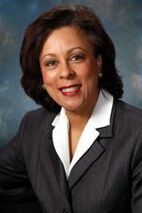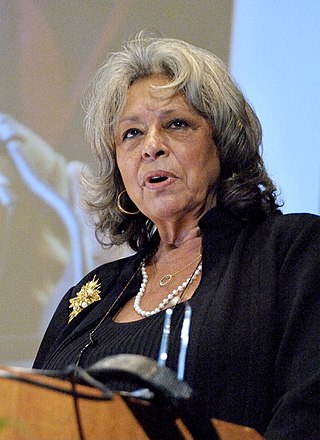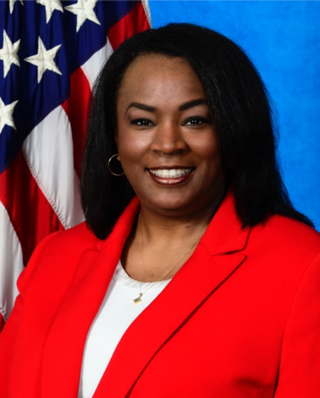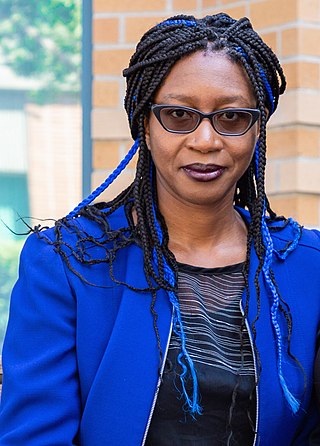Related Research Articles

Mae Carol Jemison is an American engineer, physician, and former NASA astronaut. She became the first African-American woman to travel into space when she served as a mission specialist aboard the Space Shuttle Endeavour in 1992. Jemison joined NASA's astronaut corps in 1987 and was selected to serve for the STS-47 mission, during which the Endeavour orbited the Earth for nearly eight days on September 12–20, 1992.

Eleanor Holmes Norton is an American lawyer and politician serving as a delegate to the United States House of Representatives, representing the District of Columbia since 1991. She is a member of the Democratic Party.
Bishop College was a historically black college, founded in Marshall, Texas, United States, in 1881 by the Baptist Home Mission Society. It was intended to serve students in east Texas, where the majority of the black population lived at the time. In 1961 the administration moved the college into Dallas, Texas. It closed in 1988.

Pan-Africanism is a worldwide movement that aims to encourage and strengthen bonds of solidarity between all indigenous and diasporas of African ancestry. Based on a common goal dating back to the Atlantic slave trade, the movement extends beyond continental Africans with a substantial support base among the African diaspora in the Americas and Europe.

Eddie Bernice Johnson is an American politician who represented Texas's 30th congressional district in the United States House of Representatives from 1993 to 2023. Johnson is a member of the Democratic Party.

Dorothy Irene Height was an African American civil rights and women's rights activist. She focused on the issues of African American women, including unemployment, illiteracy, and voter awareness. Height is credited as the first leader in the civil rights movement to recognize inequality for women and African Americans as problems that should be considered as a whole. She was the president of the National Council of Negro Women for 40 years. Height's role in the "Big Six" civil rights movement was frequently ignored by the press due to sexism. In 1974, she was named to the National Commission for the Protection of Human Subjects of Biomedical and Behavioral Research, which published the Belmont Report, a bioethics report in response to the infamous "Tuskegee Syphilis Study.

Gracia M. Hillman is the former Vice President for External Affairs at Howard University in Washington, D.C. She grew up in New England, USA. She is the daughter of the late Maria DaGraca Hillman and the late George Hillman. She has two brothers, George Hillman, Jr. and Robert W. Hillman. Ms. Hillman is of Cape Verdean descent.

Jo Freeman aka Joreen, is an American feminist, political scientist, writer and attorney. As a student at the University of California, Berkeley in the 1960s, she became active in organizations working for civil liberties and the civil rights movement. She went on to do voter registration and community organization in Alabama and Mississippi and was an early organizer of the women's liberation movement. She authored several classic feminist articles as well as important papers on social movements and political parties. She has also written extensively about women, particularly on law and public policy toward women and women in mainstream politics.

Karen Ruth Bass is an American politician, social worker and former physician assistant who has served as the 43rd mayor of Los Angeles since 2022. A member of the Democratic Party, Bass previously served in the U.S. House of Representatives from 2011 to 2022 and in the California State Assembly from 2004 to 2010, serving as speaker during her final Assembly term.
Paula Denice McClain, is a professor of political science, public policy, and African and African American Studies at Duke University and is a widely quoted expert on racism and race relations. Her research focuses primarily on racial minority-group politics and urban politics. She is co-director of Duke's Center for the Study of Race, Ethnicity and Gender in the Social Sciences, and director of the American Political Science Association's Ralph Bunche Summer Institute, which is hosted by Duke and funded by the National Science Foundation and Duke.

Vivian Winona Pinn is an American physician-scientist and pathologist known for her advocacy of women's health issues and concerns, particularly for ensuring that federally funded medical studies include female patients, and well as encouraging women to follow medical and scientific careers. She served as associate director for research on women's health at the National Institutes of Health (NIH), concurrently was the inaugural director of NIH's Office of Research on Women's Health. Pinn previously taught at Harvard University, Tufts University, and Howard University College of Medicine. Since retiring from NIH in 2011, Pinn has continued working as a senior scientist emerita at the Fogarty International Center.

Victoria Garvin was an American political activist, Pan-Africanist, and self-described "working class internationalist." While growing up in a working-class family during the height of the Great Depression, Garvin was exposed early on to the realities of both proletariat and racial exploitation. Garvin became a prominent organizer in the Black Left during the height of McCarthyism, before traveling to Nigeria, Ghana, and China. In Ghana, Garvin was a member of a committee who received Malcolm X and created his itinerary, since Garvin had previously met him in Harlem. As a lifelong activist and radical intellectual, Garvin created direct links between Black Power politics, Pan-Africanism, and Third World liberation.

Jewel Limar Prestage was an American political scientist, citizen activist, educator, mentor, and author. She is the first African-American woman to receive a doctorate in political science in the United States. Prestage mentored many others in her field, which is how she received the title, "The Mother of Black Political Science." Prestage conducted ample research on African Americans' role in the political process. In 1977, she co-authored the anthology A Portrait of Marginality, which examines the political socialization of Black women.

Carla Denise Cotwright-Williams is an American mathematician who works as a Technical Director and Data Scientist for the United States Department of Defense. She was the second African-American woman to earn a doctorate in mathematics at the University of Mississippi.

Tiffany Willoughby-Herard is an American academic and author who is an associate professor in the Department of African American Studies at the University of California, Irvine and President of the National Conference of Black Political Scientists. Her research focusses on black political thought, black radical movements, and queer and trans sexualities.
Valeria Sinclair-Chapman is an American political scientist, currently a professor of political science and African-American studies at Purdue University. Sinclair-Chapman studies American political institutions, the representation of minority groups in the United States Congress, and minority political participation, particularly how excluded groups come to be included in American politics.
Herchelle Sullivan Challenor is a foreign policy expert, international civil servant, university administrator, and was one of the key activists in the Atlanta Student Movement, part of the Civil Rights Movement, of the early 1960s.
Catherine E. Rudder is an American political scientist. She is professor emerita in the School of Public Policy at George Mason University, where she has also been Associate Dean for Academic Affairs. As a scholar of public policy in the United States, she focuses on congressional reform and the making of American tax policy. Rudder has also been Executive Director of the American Political Science Association, and Chief of Staff to Representative Wyche Fowler.
Rita Mae Kelly was an American political scientist. She was a professor of political science at the University of Texas at Dallas, where she held the Andrew R. Cecil Endowed Chair in Applied Ethics. She was also the Dean of the School of Social Sciences at the University of Texas at Dallas.
References
- 1 2 3 4 "Interview with Mae C. King, February 5, 1994". APSA/Pi Sigma Alpha: African American Political Scientists Oral History Project, University of Kentucky Libraries. 5 February 1994. Retrieved 11 March 2020.
- 1 2 3 4 5 6 7 8 9 10 11 12 13 14 Wallace, Sherri L. (January 2020). "Chronicling Our Legacy of Leadership: The Task Force Historical Record on the Founders of the National Conference of Black Political Scientists". National Review of Black Politics. 1 (1): 80–131. doi: 10.1525/nrbp.2020.1.1.80 .
- 1 2 3 4 5 6 Adolphus G. Belk, Jr.; Robert C. Smith; Sherri L. Wallace (January 2020). "Having Their Say, Leaving Their Mark: The Lasting Contributions of NCOBPS and Black Political Scientists to the Political Science Discipline". National Review of Black Politics. 1 (1): 141–153. doi: 10.1525/nrbp.2020.1.1.141 .
- ↑ King, Mae C. (1982). "The Politics of Sexual Stereotypes". Journal of Black Studies and Research. 13 (4–5): 2–13. doi:10.1080/00064246.1985.11735755.
- ↑ "African Heritage Studies Association 49th annual conference" (PDF). African Heritage Studies Association. October 2018. Retrieved 11 March 2020.
- ↑ "ASHA Officers and Board of Directors" (PDF). African Heritage Studies Association. 4 November 2017. Retrieved 11 March 2020.
- ↑ "Samples of Activities of Full-Time Faculty Members (2002-2003)" (PDF). Howard University College of Arts and Sciences. 2003. Retrieved 11 March 2020.
- ↑ Olayiwola Abegunrin; Sabella Abidde, eds. (2018). "African Intellectuals and the State of the Continent: Essays in Honor of Professor Sulayman S. Nyang". Cambridge Scholars Publishing. Retrieved 11 March 2020.
- ↑ B.A. Gow, Sandy (1999). "Reviewed Work: Basic Currents of Nigerian Foreign Policy by Mae C. King". The International Journal of African Historical Studies. 32 (2–3): 579–580. doi:10.2307/220445. JSTOR 220445.
- ↑ "CBCF publishes book commemorating CBC, The Conscience of the Congress: How the Congressional Black Caucus Changed America". Impressions. 16 October 2012. Retrieved 11 March 2020.
- ↑ "Welcome to the 40th Anniversary Celebration of the Congressional Black Caucus". Howard University. 2011. Retrieved 11 March 2020.
- 1 2 "Award Descriptions". Association for the Study of Black Women in Politics. 2019. Retrieved 11 March 2020.